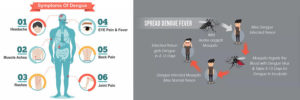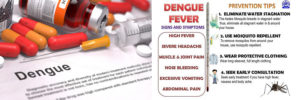Dengue Fever – Questions and Answers

Dengue is a debilitating viral disease of the tropics, transmitted by mosquitoes, and causing sudden fever and acute pains in the joints.
Dengue is spread by infected mosquitoes, usually the Aedes aegypti and Aedes albopictus varieties. These mosquitoes bite during the day, most often early in the morning or in the early evening before dusk. They’re often found living around sources of stagnant water in built-up areas, such as wells, water storage tanks or old car tyres.
Dengue isn’t spread from person to person. You can get it again if you’ve had it before, as you’ll only be immune to one particular variant of the virus.
Symptoms of dengue usually develop suddenly 4 to 10 days after becoming infected. Symptoms can include:
– a high temperature (fever), which can reach 40C (104F) or higher
– a severe headache
– pain behind the eyes
– muscle and joint pain
– feeling or being sick
– a widespread red rash
– loss of appetite
The symptoms normally pass in about a week, although you may feel tired and slightly unwell for several weeks afterwards.
In rare cases severe dengue can develop after the initial symptoms.
See your GP if you develop a fever or flu-like symptoms within two weeks of returning from an area where the dengue virus is found. Remember to tell them where you’ve been travelling.
Go to a local doctor or hospital if you develop symptoms while travelling or living in an area where dengue is common. There’s little a doctor can do to help you recover, but it’s important to get a proper diagnosis in case there’s another cause of your symptoms.
You may need a blood test to confirm that you have dengue.
There’s no cure or specific treatment for dengue. Treatment involves relieving your symptoms while the infection runs its course.
You can usually look after yourself at home. The following can help:
– take paracetamol to relieve pain and fever – avoid aspirin or ibuprofen, as these can cause bleeding problems in people with dengue
– drink plenty of fluids to prevent dehydration – if you’re currently abroad, only drink bottled water from properly sealed bottles
– get plenty of rest
You should start to feel better in around a week, although it may be a few weeks before you feel your normal self again. Get medical advice if your symptoms don’t improve.

Dengue isn’t found in the UK. Cases in the UK only occur in people who’ve recently travelled to an area where the virus is common. Dengue is found in parts of:
– southeast Asia
– the Caribbean
– the Indian subcontinent
– South and Central America
– Africa
– the Pacific Islands
– Australia
There’s currently no widely available vaccine for dengue. You can prevent it by avoiding being bitten by mosquitoes. The following can reduce your risk of being bitten:
Talk to your doctor about long-term prevention if you live in an area where dengue is common.
Eliminate areas of stagnant water.
Sleeping under a mosquito net may help prevent being bitten by an infected mosquito.
Covering your skin or using bug sprays containing DEET may also help prevent infection.
Insect repellent clothing and accessories are also a great protection from unwanted bites.

